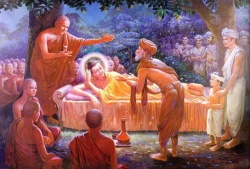Difference between revisions of "Nīvaraṇa"
(Created page with "thumb|250px| <poem> '''nīvaraṇa''': 'hindrances', are 5 qualities which are obstacles to the mind and blind our mental vision. In the p...") |
|||
| (4 intermediate revisions by 3 users not shown) | |||
| Line 1: | Line 1: | ||
[[File:10854 n.jpg|thumb|250px|]] | [[File:10854 n.jpg|thumb|250px|]] | ||
<poem> | <poem> | ||
| − | '''[[nīvaraṇa]]''': '[[hindrances]]', are 5 qualities which are obstacles to the [[mind]] and blind our [[mental]] vision. In the presence of them we cannot reach neighbourhood-concentration ([[upacāra-samādhi]]) and full concentration ([[appanā-samādhi]]), and are unable to discern clearly the [[truth]]. They are: | + | '''[[nīvaraṇa]]''': '[[hindrances]]', are 5 qualities which are [[obstacles]] to the [[mind]] and [[blind]] our [[mental]] [[vision]]. In the presence of them we cannot reach [[neighbourhood-concentration]] ([[upacāra-samādhi]]) and [[full concentration]] ([[appanā-samādhi]]), and are unable to discern clearly the [[truth]]. They are: |
| − | 1. sensuous desire ([[kāmacchanda]]), | + | 1. [[sensuous desire]] ([[kāmacchanda]]), |
| − | 2. ill-will ([[byāpāda]]), | + | 2. [[ill-will]] ([[byāpāda]]), |
| − | 3. sloth and torpor ([[thīna-middha]]), | + | 3. [[sloth and torpor]] ([[thīna-middha]]), |
| − | 4. restlessness and scruples ([[uddhacca-kukkucca]]), and | + | 4. [[restlessness and scruples]] ([[uddhacca-kukkucca]]), and |
| − | 5. skeptical doubt ([[vicikicchā]] ; q.v.). | + | 5. [[skeptical doubt]] ([[vicikicchā]] ; q.v.). |
[[File:8 ab.jpg|thumb|250px|]] | [[File:8 ab.jpg|thumb|250px|]] | ||
| − | In the beautiful similes in A. V, 193, sensuous [[desire]] is compared with water mixed with manifold colors, ill-will with boiling water, sloth and torpor with water covered by moss, restlessness and scruples with agitated water whipped by the wind, skeptical doubt with turbid and muddy water. Just as in such water one cannot perceive one's own reflection, so in the presence of these 5 [[mental]] [[hindrances]], one cannot clearly discern one's own benefit, nor that of others, nor that of both. | + | In the [[beautiful]] similes in A. V, 193, [[sensuous]] [[desire]] is compared with [[water]] mixed with manifold colors, [[ill-will]] with boiling [[water]], [[sloth and torpor]] with [[water]] covered by moss, [[restlessness and scruples]] with agitated [[water]] whipped by the [[wind]], [[skeptical doubt]] with turbid and muddy [[water]]. Just as in such [[water]] one cannot {{Wiki|perceive}} one's own {{Wiki|reflection}}, so in the presence of these 5 [[mental]] [[hindrances]], one cannot clearly discern one's own [[benefit]], nor that of others, nor that of both. |
| − | Regarding the temporary suspension of the [[5 hindrances]] on entering the first absorption, the stereotype [[Sutta]] text (e g. A. IX, 40) runs as follows: | + | Regarding the temporary [[suspension]] of the [[5 hindrances]] on entering the first [[absorption]], the stereotype [[Sutta]] text (e g. A. IX, 40) runs as follows: |
| − | "He has cast away sensuous [[desire]]; he dwells with a heart free from sensuous [[desire]]; from [[desire]] he cleanses his heart. | + | "He has cast away [[sensuous]] [[desire]]; he dwells with a [[heart]] free from [[sensuous]] [[desire]]; from [[desire]] he cleanses his [[heart]]. |
| − | "He has cast away ill-will; he dwells with a heart free from ill-will, cherishing love and [[compassion]] toward all living beings, he cleanses his heart from ill-will. | + | "He has cast away [[ill-will]]; he dwells with a [[heart]] free from [[ill-will]], cherishing [[love]] and [[compassion]] toward all [[living beings]], he cleanses his [[heart]] from [[ill-will]]. |
| − | "He has cast away sloth and torpor; he dwells free from sloth and torpor; loving the light, with watchful [[mind]], with clear [[consciousness]], he cleanses his mind from sloth and torpor. | + | "He has cast away [[sloth and torpor]]; he dwells free from [[sloth and torpor]]; [[loving]] the [[light]], with watchful [[mind]], with clear [[consciousness]], he cleanses his [[mind]] from [[sloth and torpor]]. |
| − | "He has cast away restlessness and scruples; dwelling with mind undisturbed, with heart full of peace, he cleanses his [[mind]] from restlessness and scruples. | + | "He has cast away [[restlessness and scruples]]; dwelling with [[mind]] undisturbed, with [[heart]] full of [[peace]], he cleanses his [[mind]] from [[restlessness and scruples]]. |
| − | "He has cast away skeptical doubt; dwelling free from doubt, full of confidence in the good, he cleanses his heart from doubt. | + | "He has cast away [[skeptical doubt]]; dwelling free from [[doubt]], full of [[confidence]] in the good, he cleanses his [[heart]] from [[doubt]]. |
| − | "He has put aside these [[5 hindrances]], and come to know these paralyzing defilements of the [[mind]]. And far from sensual impressions, far from unwholesome things, he enters into the first absorption, etc." | + | "He has put aside these [[5 hindrances]], and come to know these paralyzing [[defilements]] of the [[mind]]. And far from {{Wiki|sensual}} [[impressions]], far from [[unwholesome]] things, he enters into the first [[absorption]], etc." |
| − | The overcoming of these [[5 hindrances]] by the absorptions is, as already pointed out, a merely temporary suspension, called 'overcoming through repression' ([[vikkhambhana-pahāna]]). They disappear forever on entering the 4 supermundane [[paths]] (s. [[ariyapuggala]]), i.e. skeptical doubt on reaching Sotāpanship; sensuous [[desire]], ill-will and [[mental]] worry on reaching [[Anāgāmiship]]; sloth, torpor and restlessness on reaching [[Arahatship]]. | + | The [[overcoming]] of these [[5 hindrances]] by the absorptions is, as already pointed out, a merely temporary [[suspension]], called '[[overcoming]] through repression' ([[vikkhambhana-pahāna]]). They disappear forever on entering the 4 [[supermundane]] [[paths]] (s. [[ariyapuggala]]), i.e. [[skeptical doubt]] on reaching Sotāpanship; [[sensuous]] [[desire]], [[ill-will]] and [[mental]] {{Wiki|worry}} on reaching [[Anāgāmiship]]; [[sloth]], [[torpor]] and [[restlessness]] on reaching [[Arahatship]]. |
| − | For their origination and their overcoming, s. A. I, 2; VI, 21; S. XLVI, 51. | + | For their origination and their [[overcoming]], s. A. I, 2; VI, 21; S. XLVI, 51. |
| − | See The [[Five Mental Hindrances]], by Nyanaponika Thera (WHEEL 26). | + | See The [[Five Mental Hindrances]], by [[Nyanaponika Thera]] (WHEEL 26). |
</poem> | </poem> | ||
{{R}} | {{R}} | ||
[http://dictionary.buddhistdoor.com/en/search dictionary.buddhistdoor.com] | [http://dictionary.buddhistdoor.com/en/search dictionary.buddhistdoor.com] | ||
[[Category:Hindrances]] | [[Category:Hindrances]] | ||
Latest revision as of 10:32, 3 October 2014
nīvaraṇa: 'hindrances', are 5 qualities which are obstacles to the mind and blind our mental vision. In the presence of them we cannot reach neighbourhood-concentration (upacāra-samādhi) and full concentration (appanā-samādhi), and are unable to discern clearly the truth. They are:
1. sensuous desire (kāmacchanda),
2. ill-will (byāpāda),
3. sloth and torpor (thīna-middha),
4. restlessness and scruples (uddhacca-kukkucca), and
5. skeptical doubt (vicikicchā ; q.v.).
In the beautiful similes in A. V, 193, sensuous desire is compared with water mixed with manifold colors, ill-will with boiling water, sloth and torpor with water covered by moss, restlessness and scruples with agitated water whipped by the wind, skeptical doubt with turbid and muddy water. Just as in such water one cannot perceive one's own reflection, so in the presence of these 5 mental hindrances, one cannot clearly discern one's own benefit, nor that of others, nor that of both.
Regarding the temporary suspension of the 5 hindrances on entering the first absorption, the stereotype Sutta text (e g. A. IX, 40) runs as follows:
"He has cast away sensuous desire; he dwells with a heart free from sensuous desire; from desire he cleanses his heart.
"He has cast away ill-will; he dwells with a heart free from ill-will, cherishing love and compassion toward all living beings, he cleanses his heart from ill-will.
"He has cast away sloth and torpor; he dwells free from sloth and torpor; loving the light, with watchful mind, with clear consciousness, he cleanses his mind from sloth and torpor.
"He has cast away restlessness and scruples; dwelling with mind undisturbed, with heart full of peace, he cleanses his mind from restlessness and scruples.
"He has cast away skeptical doubt; dwelling free from doubt, full of confidence in the good, he cleanses his heart from doubt.
"He has put aside these 5 hindrances, and come to know these paralyzing defilements of the mind. And far from sensual impressions, far from unwholesome things, he enters into the first absorption, etc."
The overcoming of these 5 hindrances by the absorptions is, as already pointed out, a merely temporary suspension, called 'overcoming through repression' (vikkhambhana-pahāna). They disappear forever on entering the 4 supermundane paths (s. ariyapuggala), i.e. skeptical doubt on reaching Sotāpanship; sensuous desire, ill-will and mental worry on reaching Anāgāmiship; sloth, torpor and restlessness on reaching Arahatship.
For their origination and their overcoming, s. A. I, 2; VI, 21; S. XLVI, 51.
See The Five Mental Hindrances, by Nyanaponika Thera (WHEEL 26).

